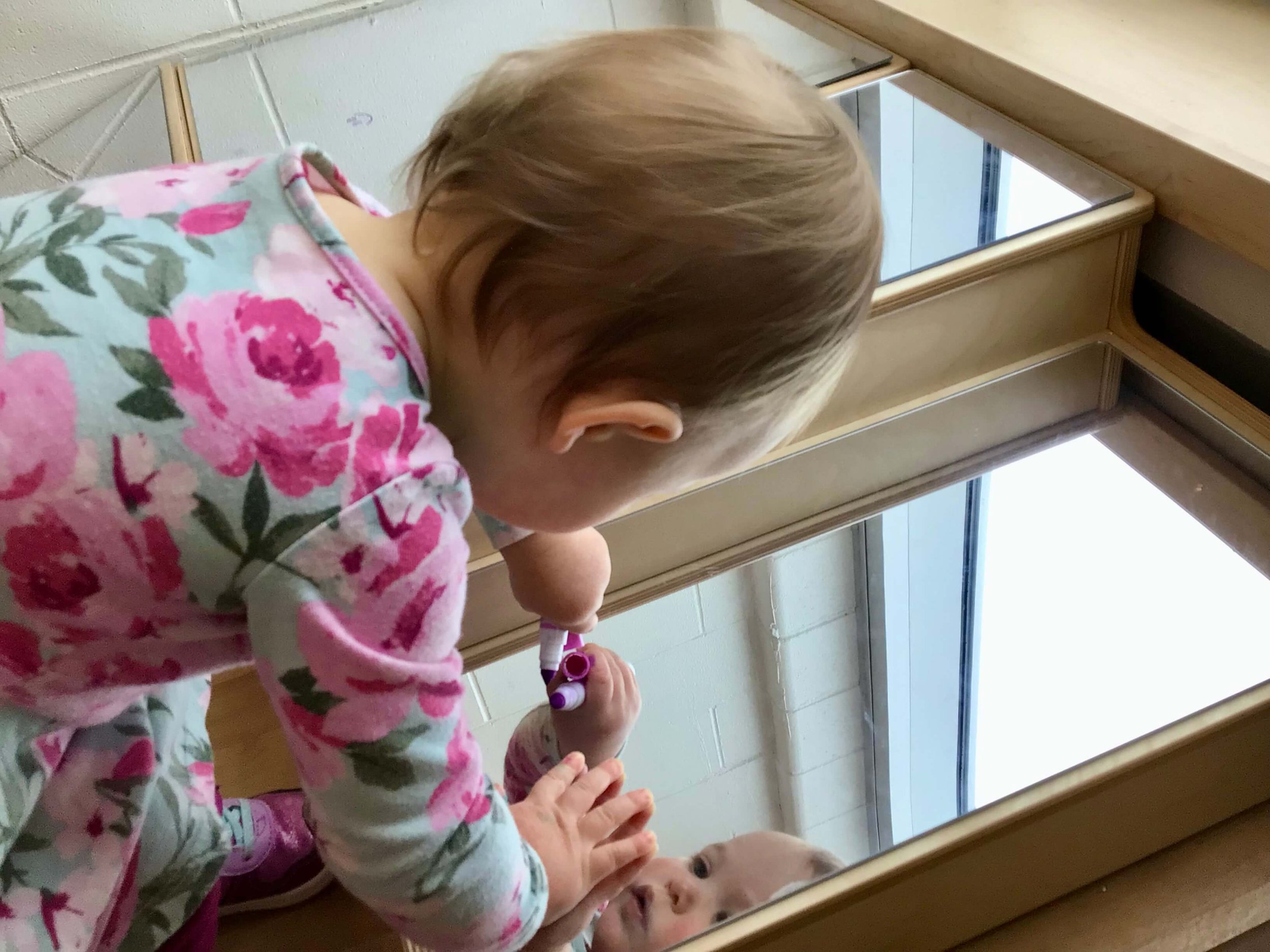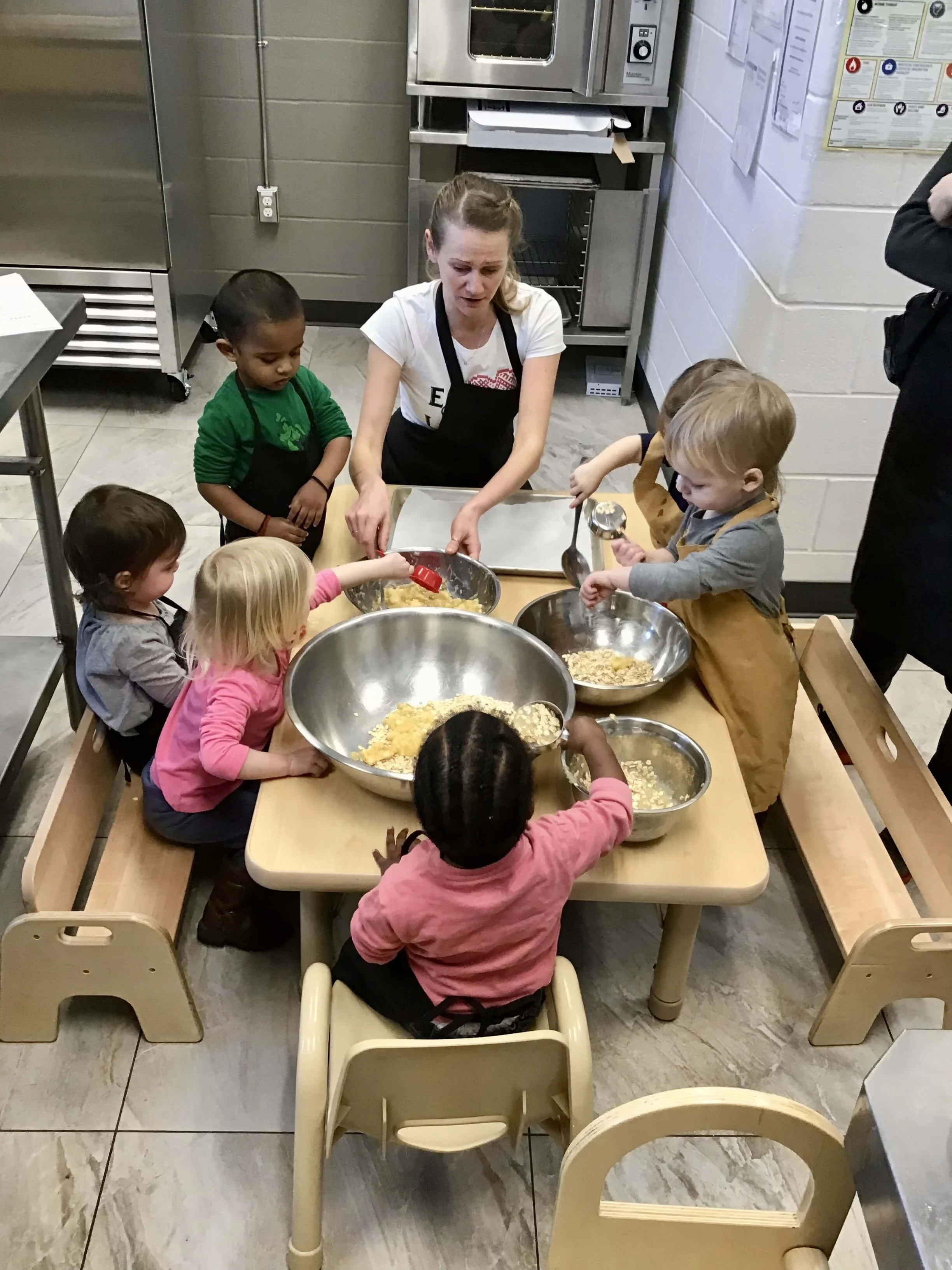Our Programs
-

Infant Full-Day
Ratio: 1:3 (Max 3:10)
Our infant programs support children from birth to 18 months of age. Our nurturing educators will quickly develop a bond of trust with you and your child. We work alongside the children and based on their interests create a safe and engaging space for exploration as they begin to make sense of their world. Our individualized program will ensure that your child’s needs are being met according to each developmental stage they go through during this time of rapid growth.
-

Toddler Full-Day
Ratio: 1:5
Our toddler programs support children from 18 to 30 months of age. From our carefully laid out classroom environments to our positive interactions, we are encouraging your toddler to explore and learn. We will gently guide and teach them developmentally appropriate self-help skills such as tidying up from lunch and snack, feeding themselves, helping with putting toys away, and beginning to dress themselves for outdoor fun. We will help them to express their thoughts and ideas through many mediums while their speech skills develop.
-

Preschool Full-Day
Ratio: 1:8
Our preschool programs support children from 30 months to 4 years of age. In preschool we try to focus on the whole child. We provide a foundation for academic learning through play and by encouraging the children to become more independent, learn self-help skills, build their self-regulation skills and resiliency, be creative, work on problem solving, and communicate with their peers. Since we focus so much on the children’s interests as a basis for learning, it helps the children to discover themselves and be excited about learning new things!
Fees & Subsidy
Without help to pay for it, many families cannot afford quality child care. The Region of Waterloo's Child Care Subsidy program helps parents pay for care so that they can go to work or school knowing their children are well cared for.
Subsidized child care is available at all JHCCC locations to families who qualify.To determine eligibility for subsidized child care please visit The Region of Waterloo’s website to find out if you qualify and start your application.
Please note, the Region suggests applying nine weeks before care begins. If you apply too early, you may need to apply again closer to your child's start date.
For current information on our fees, please refer to the Parent Handbook on the Current Families page.
Sample Schedule
We believe that children do well if they have a sense of what to expect in their day. Each program sets their own schedule keeping in mind the needs of their group of children. Both indoor and outdoor times may be shortened or extended based on the interests of the children and the weather.
7:30 - 11:30am: The centre opens at 7:30 a.m. and the first children begin to arrive. As children arrive, they will be greeted by an educator and their arrival time noted on the attendance. Any messages shared by the parent about their evening/night and morning will be recorded in the staff communication log. The educator will help your child settle into an activity or provide comfort if the drop-off is difficult that day. All areas of the room will be open for exploration.
9:00am: Our chef will provide snack. Other play activities will continue in the room.
10:00am: After a quick tidy-up and a group meeting with stories and songs, the children will get ready to play outdoors.
11:30am: Lunch time. A favourite time of the day!
12:30 - 2:30pm: Quiet or rest time.
2:30 - 5:30pm: Similar to the morning with lots of activities, a snack, and outdoor play time. Parents begin to come to pick up their children during this time. The Educators will love to share a little bit about your child’s day with you. The centre closes at 5:30 p.m. We are so glad that we had this opportunity to share the day with your child. See you tomorrow!
Nutrition
Meals and snacks are a social time where family style food service is supported. Children are encouraged to try a variety of foods but they are allowed choice as to what they will eat and the quantity of the foods that they choose. Many times we hear that foods that a child enjoys at the centre may be items that they are very particular about at home.
The child care centre will provide lunch and snacks following a posted four week menu rotation which has been developed in conjunction with our on-site chefs, the Canada Food Guide and supported through Public Health consultation.
We work to accommodate special dietary needs. Please speak to your centre supervisor and chef to discuss any special arrangements. To reduce the risk of exposure to anaphylactic causative agents, families who are needing to provide supplemental food for their own child will be given a list of food items that must not be brought to the centre.
Play
In all of our programs we offer large, uninterrupted periods for play both indoors and outdoors. We consider our playgrounds to be our outdoor classrooms. We spend a minimum of 2 hours a day outside.
It is through play that children experiment, experience, practice and build knowledge of the world around them.
Our educators observe the children, ask questions of themselves and the children in order to identify where each child is in their developmental journey and to decide what challenges and provocations can be provided to the child to best help them to grow socially, intellectually, physically and emotionally.
Renowned child psychologist Jean Piaget said, “Play is the work of children.”
Rest
Periods of rest are essential to the growth and social, emotional and physical well-being of children. Depending on the age of the child, rest-time at the centre will look different. Infants will sleep as needed. There is no set sleep time for them. Each will be assigned a crib in a separate sleep room. All children will be monitored during times of sleep/rest.
Toddlers and preschoolers will have a scheduled 2-hour rest time which generally begins shortly after the lunchtime meal. Each child will be assigned their own cot. The lights in the playroom will be dimmed, quiet music played and the educators will help to settle the children by sitting next to them and rubbing their backs if the child would like that.
Children who do not sleep will be given quiet activities to participate in such as looking at books on their bed while the other children settle. Once the children who need to sleep are settled the children who are awake will be brought to an area of the room to participate in other quiet activities such as colouring, painting, playdough, and puzzles.





